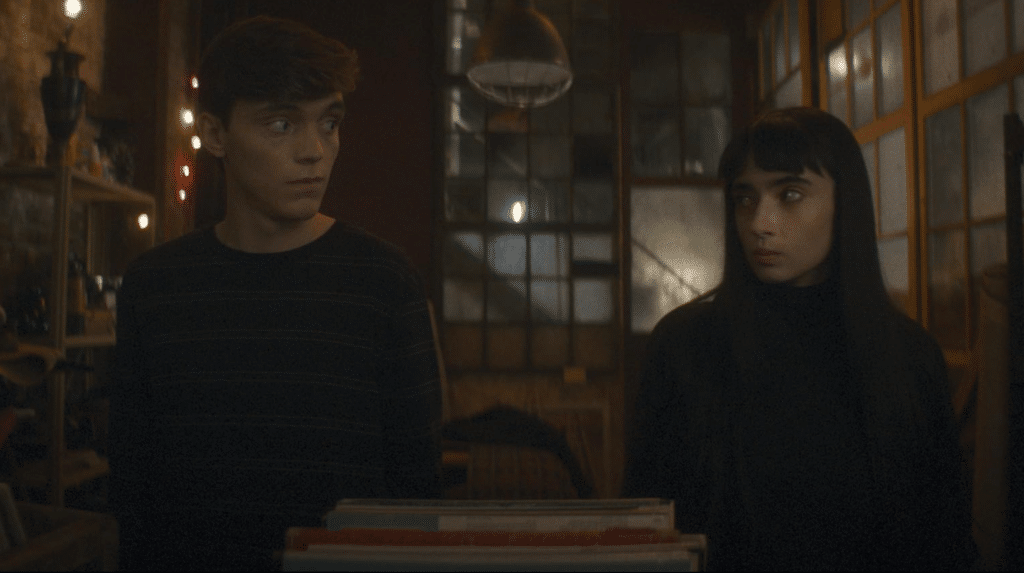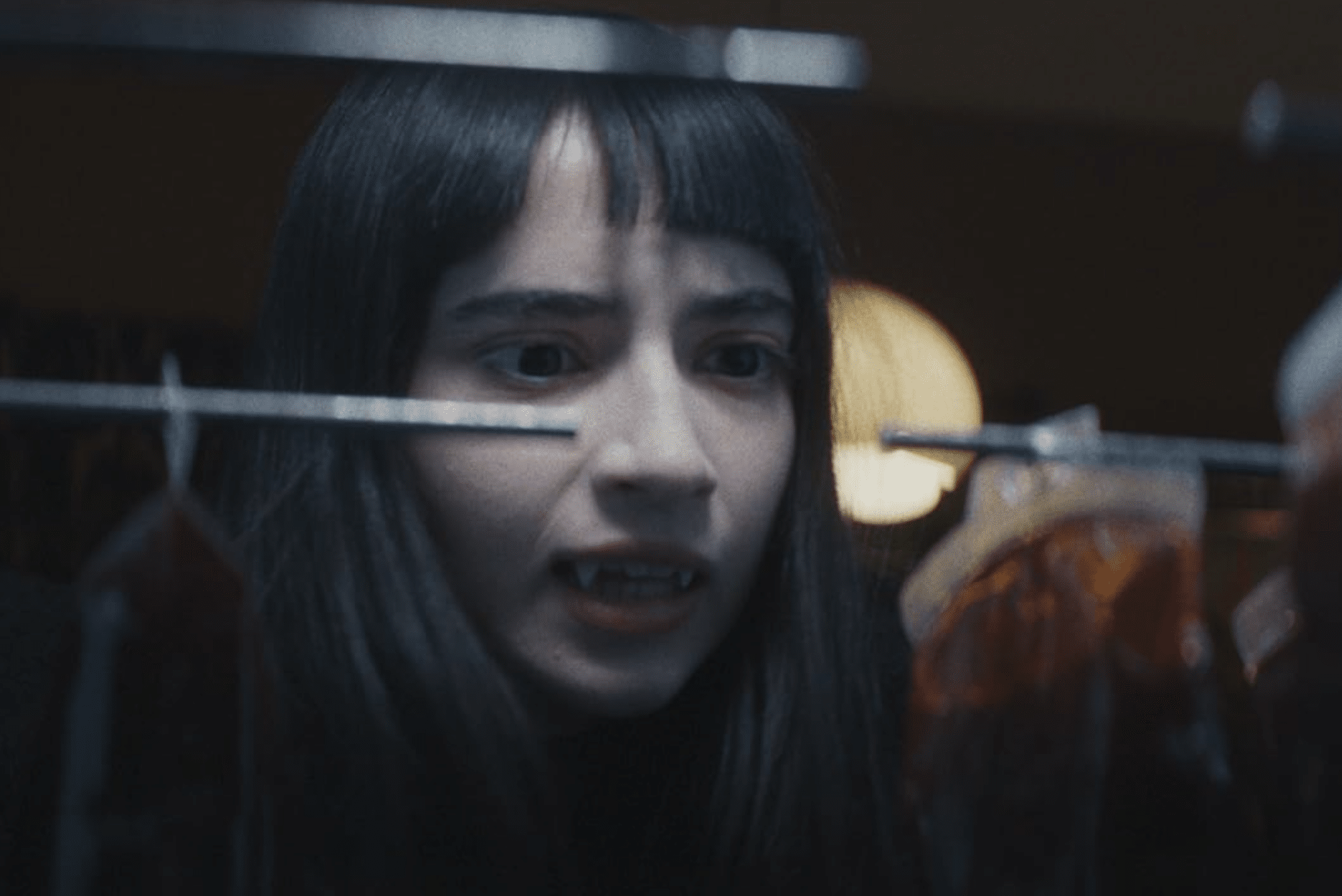
With a rather unwieldy title, Humanist Vampire Seeking Consenting Suicidal Person (Vampire humaniste cherche suicidaire consentant) starts at – a little girl’s birthday party. The little girl, Sasha, surprises her close-knit family group with her innate ability to play the keyboard she’s given as a gift – something which they puzzle over while she plays. But that’s not all: her aunt has also hired a children’s entertainer to come to the house. Come to think of it, there are no other children here, which is a little odd – and as Rico the Clown gets into his stride, the family seems to feel that his act is going on longer than they really needed. Then it becomes clearer: Rico isn’t really here to entertain, he’s here as food. The family are vampires, but little Sasha is new to the whole blood-drinking thing, and this quiet, sensitive child isn’t keen to participate in the main meal. She likes Rico. She doesn’t want to eat him.
This causes a problem for the family, who are seriously worried about what will happen to Sasha: like with any child refusing to eat, they fret about her wellbeing. A sympathetic dentist informs them that her fangs are there, but undescended; apparently her problem is compassion, which is manifesting as a kind of PTSD, stopping her from functioning as a normal vampire. Sasha’s father is all for a patient, child-led approach; the women of the family are more hard-line. Years pass: we next meet Sasha (Sara Montpetit) in what looks like her late teens – allowing for the fact that vampires don’t seem to age in a normal way – and she’s still refusing to kill, opting instead to busk-by-night with her beloved keyboard, eking out a living (and of course, still living at home, where her soft-touch dad enables her murder-free lifestyle by ensuring that there are baggies of blood available to keep her going).
Things begin to change for Sasha when, one night, she spots what looks like it’s about to be a suicide. A young man is poised on the roof of a local bowling alley, but – when he’s found by an ordinarily indifferent, overworked co-worker – agrees to climb down, resuming his dreadful part-time job. It’s enough to drive him to try to end his life again after his shift – something he messes up – and a watching, waiting Sasha finally feels a bit of bloodlust. Her fangs descend. But again, her natural empathy takes over. She’s just no killer, and instead seems drawn to this rather tragic, put-upon fellow traveller. In one last-ditch attempt to bring out the vampire in her, her parents ship her off to live with cool, calm and collected cousin Denise, hoping she’ll learn the ropes at last (they cut off her blood-bag allowance, too). But whatever is going to happen, Paul (Félix-Antoine Bénard) seems to be at the heart of it all. Their paths cross again at a suicidal ideation support group, and gradually, they form a bond, coming up with a plan.
It’s pretty clear from the outset that the film is going to be a meeting of two sensitive outsider souls and a coming-of-age story. Humanist Vampire certainly fulfils this expectation, even whilst feeling either faintly familiar, or very reminiscent of other vampire-adjacent stories. I say vampire-adjacent, because in common with a lot of modern vampire narratives, vampirism itself is two steps removed here, with only limited attention paid to either the grisly nitty-gritty of murderous bloodletting, or to how, exactly, vampirism fits into human society. The whole ‘baggies of blood’ in the fridge idea is reminiscent of bottles of True Blood in – erm – True Blood, a way for vampires to get on with things whilst mitigating the need to kill; the handling of the bullying motif is a little like Let The Right One In; there’s a little of the tragic familial and romantic dynamics of another long title, My Heart Can’t Beat Unless You Tell It To, and – although it contains a different supernatural dynamic – A Ghost Waits.
Humanist Vampire has more subtle flashes of humour than My Heart Can’t Beat, and has outsourced the bulk of even its implied violence, moving it quite literally off-screen, for example, when Denise kills, but the humane, low-key approach is similar. In its attention to characterisation, Humanist Vampire does decide to skip some of the questions it suggests about the whole vampire thing, however: it insinuates a pretty regular family, presumably having children in the normal way, living alongside human society. How it all fits together is omitted, as the film keeps its gaze closely on Sasha and Paul, but its choice to make this a story about independence and finding happiness has a lot of value: it’s engaging without growing obtuse, and sticks with being quirky and humane, rather than gloomy and heavy. Which is a weird thing to say, come to think of it. Whether or not it resembles other storytelling, it’s enjoyable on its own terms, as well as being beautifully shot, lit and colourised.
There are a couple of queries and criticisms: one is its use of snippets of Night of the Living Dead as its go-to horror film during one particular scene: given Romero lost the rights to his film, it always strikes me as a bad look when fellow indie filmmakers exploit the fact that it’s rights-free at the point of use, as surely they’d hate it if something similar happened to their own film. It’s also worth adding – and this is key – that the whole idea of treating suicide and the suicidal as potentially willing vampire fodder will emphatically not work for everyone. But if you can look past this, allowing the film’s generally lighter-touch tone to justify its style and content, then it’s an enjoyable, charming addition to the genre.
Humanist Vampire Seeking Consenting Suicidal Person (2023) features at Seattle’s Make Believe Film Festival, March 2024.
